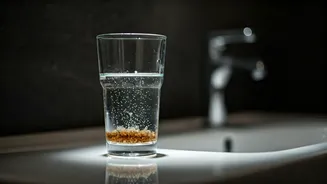Water's Skin Impact
The water we use every day seems harmless, but tap water can potentially be a silent saboteur of healthy skin. This is because tap water often contains
impurities like chlorine and other chemicals that can disrupt the skin's natural balance. It is also filled with hard minerals. These substances can strip away the skin's natural oils, leaving it dry, irritated, and more vulnerable to environmental damage. Over time, these effects can lead to various skin issues, including dryness, acne breakouts, and even premature aging. The constant exposure to these elements can gradually erode the skin's protective barrier, leading to a host of problems.
Impurities' Effects Unveiled
Tap water often houses a cocktail of unwelcome guests. Chlorine, added to disinfect the water supply, can be particularly harsh on the skin. It can cause irritation, redness, and inflammation, especially for those with sensitive skin. Hard minerals like calcium and magnesium are also problematic. They can leave behind a residue on the skin, clogging pores and potentially causing acne or other blemishes. Additionally, the presence of these minerals can affect the skin's pH balance, making it more prone to dryness and sensitivity. Understanding these impurities and their specific effects is crucial to protecting and maintaining healthy skin over time.
Identifying Skin Types
To effectively combat the potential harm from tap water, recognizing your skin type is essential. Different skin types react differently to the same elements. Dry skin tends to be more susceptible to the drying effects of tap water, leading to increased flakiness and discomfort. Oily skin, on the other hand, can experience breakouts due to the pore-clogging effects of hard minerals and chlorine. Combination skin may display a mix of these problems, with dryness in some areas and breakouts in others. Sensitive skin is particularly vulnerable to the irritating chemicals present in tap water. Identifying your skin type will help you tailor your skincare routine and choose appropriate solutions to mitigate the negative effects of tap water.
Beyond Tap Water
Exploring alternatives to tap water for facial cleansing can greatly improve skin health. Using filtered water is a simple yet effective solution, removing many impurities and minerals that can irritate the skin. Bottled water is another option, though it's important to choose one that is not too high in mineral content, depending on your skin type. Moreover, incorporating a gentle cleanser into your routine can help to minimize the impact of any residual tap water on your skin. After washing your face, applying a hydrating moisturizer is essential to replenish the skin's natural moisture barrier. Consistent care and attention can significantly enhance your skin's health.
Protecting Your Skin
Making informed choices regarding your skincare routine can significantly reduce the potential damage from tap water. When cleansing your face, always use lukewarm water, as hot water can strip away natural oils and exacerbate dryness. Also, it’s beneficial to invest in a shower filter that removes chlorine and other impurities from the water before it even touches your skin. Incorporating a serum or toner after cleansing can further hydrate and balance your skin. Regular exfoliation, a few times a week, can help remove dead skin cells and prevent clogged pores. Always pay attention to your skin's reaction to different products and adjust your skincare routine as needed.




















